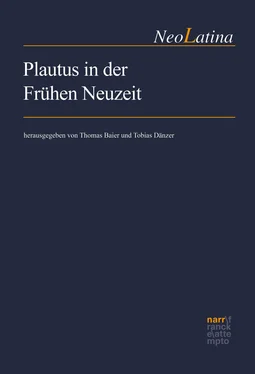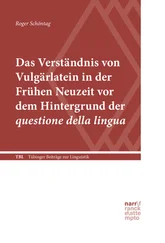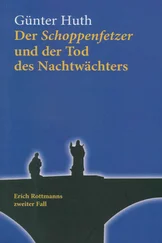Nevertheless, as Marion Gindhart pointed out to me, our assumption is wrong, and the reality more complicated.
In truth, CamerariusCamerarius d.Ä., Joachim first alludes to the Decurtatus in ten endnotes in his 1549 edition – that is, the same edition that prompted FabriciusFabricius, Georg’ letter.4 He refers to it, vaguely, as “the other book” or “in one copy,” but the readings he cites match or fit those of the Decurtatus. He does not cite it in his Epidicus Epidicus or Bacchides Bacchides, which are the first two plays in the book, and he says nothing descriptive about it at any point.
This situation suggests CamerariusCamerarius d.Ä., Joachim edited the plays in the traditional order and did not revise his work after completing them. It also suggests that in 1548 or 1549 CamerariusCamerarius d.Ä., Joachim must have quietly gotten the Decurtatus from someone while he was editing Mercator Mercator. I suspect FabriciusFabricius, Georg simply overlooked these endnotes or did not understand them, and, by sheer coincidence, sent CamerariusCamerarius d.Ä., Joachim to go find the very same manuscript he’d already taken possession of a year or two earlier.
How did CamerariusCamerarius d.Ä., Joachim get the Decurtatus? In my view, the scant use to which he put it suggests it was an unwanted gift. By 1548, he had been editing Plautus for 23 years and publishing partial results. It would not be surprising if he closed his eyes to a “white elephant” at the eleventh hour. Who would want to redo everything at that point?
Invito data, redditur albus res elephantus.
The second letter I discovered in 2017 supports that impression.
8. CamerariusCamerarius d.Ä., Joachim’ Confession
Esse ego ne nimius videar Camerariomastix,
conspice quod latuit saecula, lector, opus.
As promised above (ch. 4), I can now explain the reference to “the book of Georg FabriciusFabricius, Georg” that CamerariusCamerarius d.Ä., Joachim mentions in the preface to his 1552 Basel-HervagiusHervagius, Johannes edition.
The year after that edition appeared, CamerariusCamerarius d.Ä., Joachim published a little pamphlet, not in Basel with HervagiusHervagius, Johannes, but with Valentin Papa (Bapst) in Leipzig, the same local printer that had printed his 1545 and 1549 Plautuses. Its title is Indicationes multorum quae ad lectionem fabularum Plauti nonnihil momenti afferre possint. Quae collegit Georgius Fabricius Fabricius, Georg Chemnicensis. Emendationes editi exempli Plautini (i.e. his printed 1552 copy) a Ioachimo Camerario Camerarius d.Ä., Joachim , de recognitione ipsius (i.e. by CamerariusCamerarius d.Ä., Joachim himself, not FabriciusFabricius, Georg). The formatting of the title makes it hard to understand that this pamphlet contains two different works:
(1) CamerariusCamerarius d.Ä., Joachim’ own corrections to his 1552 Basel text, and
(2) FabriciusFabricius, Georg’ collection of the fragments of Plautus.
Hence, although the positioning of FabriciusFabricius, Georg’ name at the top of the title page makes it look like he is the author of everything (and has been so catalogued), the book belongs to CamerariusCamerarius d.Ä., Joachim.
The sole copy to survive to modern times is held in the Dresden library. The last person to look at it was Ritschl, who wrote a short notice of it.1 He describes its contents, quotes a few lines from its prefatory letter to the printer, and then adds, “This pamphlet cannot be ignored by anyone who wants to get to know CamerariusCamerarius d.Ä., Joachim’ true opinion and intention.”2 The context that FabriciusFabricius, Georg’ 1549 letter now gives us makes it clear that Ritschl was even more prophetic than he realized, for this uknown pamphlet was intended to supplement CamerariusCamerarius d.Ä., Joachim’ 1552 Basel edition of Plautus. It consists of:
(1) a 1553 letter from CamerariusCamerarius d.Ä., Joachim to Joannes HervagiusHervagius, Johannes, his printer in Basel,
(2) a 1550 letter from FabriciusFabricius, Georg to CamerariusCamerarius d.Ä., Joachim consisting of a single paragraph; it is a cover letter to
(3) FabriciusFabricius, Georg’ collection of the fragments of Plautus, and
(4) CamerariusCamerarius d.Ä., Joachim’ corrections and new notes to his 1552 Basel edition.
When HervagiusHervagius, Johannes reprinted CamerariusCamerarius d.Ä., Joachim’ 1552 edition in 1558, he treated these four sections differently:
He silently disassembled and incorporated (4) ad locum in their entirety.
He reprinted (2) and (3) in their entirety.3
He suppressed (1) without saying a word.
It is, of course, (1) that is of greatest interest today, because in it, CamerariusCamerarius d.Ä., Joachim confesses that he had been too lazy to proofread his manuscript before mailing it to HervagiusHervagius, Johannes (or less likely, that he was too lazy to check the galley proofs HervagiusHervagius, Johannes had sent him):4
Ioachimus CamerariusCamerarius d.Ä., Joachim Pabeperg. Iohanni HervagioHervagius, Johannes Bibliopolae Basiliensi S.D.
Cum nuper ad te misissem absolutum tandem opus emendatarum5 Plauti fabularum, ut tua industria ederetur ad lectionem utilem studiosorum linguae Latinae, statim postea subiit vereri id quod expressis exemplis accidisse depraehendi, ne mendosius illae6 publicarentur. Cum enim multum temporis et cogitationum mearum in illius autoris scriptis recognoscendis posuissem, et non modo taedium iam quoddam in labore diuturniore, sed nonnunquam etiam dubitationes oborirentur, nunquid talis occupationis et profanitatem offensuram esse divinum numen, et tenuitatem contemtum iri a doctis, videretur esse pertimescendum, operam tum dedimus, ut illud quasi pensum, quod mihi mea voluntas dedisset quamprimum absolveretur, et mihi a molestia cum operae tum curae acquiescere liceret.
Etsi autem et mihi ipsi et aliis probasse me confido rationes consilii et facti mei, tamen tum accidit ut illud opus correctionum nostrarum, neque diligenter in fastidio, neque plane in festinatione, neque explicate inter multiplicia negotia quae tum mihi offerebantur, confectum ad te mitteremus.
Itaque, ut dixi supra, postea cogitans verebar, ne mendosius publicarentur exempla, cum mihi et meae negligentiae et incuriae operarum vestrarum in mentem veniret.
To Johannes HervagiusHervagius, Johannes, bookseller in Basel,
Joachim CamerariusCamerarius d.Ä., Joachim of Bamberg sends greetings
Not long ago, right after I sent you the book of Plautine plays I’d finally finished emending, qualms crept in. I’d sent you those plays so you could carefully publish them for the benefit of Latin scholars, but I was worried those comedies would come out riddled with mistakes when they were published (I’ve seen it happen in printed copies).7 You see, I’d devoted a lot of time and energy to checking and rechecking Plautus’ writings, and I was getting a little sick and tired of the neverending work. And not only that, I also began doubting from time to time whether I should be afraid that God would get offended at the profanity of what I was working on, and/or that scholars would regard it as frivolous and turn their noses up at it.8
Because of that, I started doing everything I could to finish the job (which I’d given myself of my own free choice), to finish it as fast as I could so that I could get away from the toil and the anxiety and get back to normal.
Moreover, although I’m confident that the reasons of my work product have won me the esteem of myself and others (?), the fact of the matter is, I did send you a book of corrections I’d made that wasn’t completed carefully (because I was so sick of it), nor clearly (because I was rushing the job), nor as plainly as it could be (because many other matters kept getting in my way when I was trying to work on it).
Читать дальше












